Snapshot: The biggest problems facing the world
In 2010, Cambridge professor Nicholas Boyle said "a great event" in the year 2014 would be pivotal in determining whether the 21st Century would bring peace and prosperity or war and poverty.
With the loss of two Malaysia Airlines flights, the kidnapping of 200 schoolgirls in Nigeria, war in Gaza and Israel, the birth of an "Islamic State" in the Middle East, tensions in Europe over Ukraine and the Ebola outbreak in West Africa, his prediction doesn't seem that far off.
BBC News takes a look at some of the crises facing world leaders, as Nato members gather in the Welsh city of Newport for a summit.
Ukraine
Western leaders have described the Ukraine conflict as the biggest crisis in Europe since the end of the Cold War.
Tensions erupted when Russia annexed the Black Sea peninsula of Crimea in March. Two months later, pro-Russian gunmen declared independence in the eastern regions of Donetsk and Luhansk.
Some 2,600 people have been killed in fighting between Ukrainian troops and the separatists since mid-April, according to the UN.
This does not include the 298 passengers and crew of Malaysian Airlines MH17, which was shot down - probably by rebels, accidentally - in the Donetsk area in July.
The Ukraine conflict has pushed Nato's relationship with Russia to new lows, with the alliance accusing Russia of sending at least 1,000 troops and hundreds of armoured vehicles into eastern Ukraine.
The EU and US have already imposed a series of economic sanctions on Moscow for backing Ukraine's separatists.
Syria
The Syrian conflict has just entered its 42nd month. Described by the UN as "the biggest humanitarian emergency of our era," almost 50% of all Syrians have been forced to flee their homes because of clashes between government forces and rebel fighters, which include jihadists from Islamic State and al-Nusra Front, an al-Qaeda affiliate.
This time last year, the US and its allies came very close to launching punitive military air strikes on government positions after a deadly chemical weapons attack killed hundreds of civilians on the outskirts of Damascus.
But when the UK Parliament voted against intervention, depriving US President Barack Obama of crucial support and sowing doubts among US politicians, the move was quickly quashed.
A positive outcome of the chemical weapons crisis was the destruction of Syria's chemical weapons stockpile, although there are fears that some weapons remain unaccounted for and may be used by government forces or end up in the hands of extremists.
President Bashar al-Assad has been gaining the upper hand in the conflict, with the rebels beset by divisions and denied the heavy weapons they need by their foreign backers.
Questions remain over whether more could have been done to prevent the chaos seen today in the region, with Syrian sectarian tensions spilling into neighbouring Lebanon and Iraq.
The divisions among Syria's rebels have also created a void that led to the birth of an entity posing a whole new threat to the region: the rise of Islamic State.
Islamic State
The Syria conflict has become overshadowed by the rise of the Islamic State (IS) group, which has seized vast swathes of eastern Syria and northern and western Iraq. The militants' emergence has prompted US military intervention in the region once again.
Formerly known as the Islamic State in Iraq and Levant (Isis), IS has developed a reputation for its brutal tactics. Its mass killings and abductions of members of religious and ethnic minorities, as well as the beheadings of two US journalists, have sparked fear and outrage across the world.
IS has been an active force in Syria since April 2013. Its size is unclear, but it is thought to include thousands of fighters, many of them foreign jihadists.
The number of fighters IS has drawn from European countries and the US has shocked many in the West.
The group's capture of Iraq's second largest city of Mosul in June was due in part to its support from Iraq's Sunni Arab minority community - including tribal militants and former army personnel - who were disillusioned by the exclusionist policies of outgoing Prime Minister Nouri Maliki.
Iran subsequently dropped its support for Mr Maliki's bid for a third term in office and even suggested working together with the US to counter the threat of IS.
Militant Islam
Islamic State is not alone in trying to establish an Islamic caliphate in the world.
Nigeria's militant Islamist group Boko Haram says it has set up its own caliphate in the areas it controls in the north-east of the country. The group's kidnapping of more than 200 schoolgirls near Chibok, Borno state, in April sparked global outrage.
It has stepped up its campaign against the Nigerian army in recent weeks, even carrying out cross-border raids into Cameroon.
Meanwhile, al-Qaeda's affiliates in Yemen and North and East Africa continue to plague governments and national armies there, although they don't always make the headlines these days now that IS has stolen the limelight.
Islamist militant group al-Shabab continues to control large swathes of territory in rural areas of Somalia and carry out bombings and assassinations in the capital, Mogadishu. It said it was behind last year's dramatic siege of the Westgate mall in the Kenyan capital, killing at least 67 people.
Afghanistan
There has been no let up in the intensity of violence and attacks carried out by the Taliban since US-led combat troops started to withdraw from the country.
The Afghan army has seen a rise in the number of casualties as it increasingly takes over the front line in the battle against militants. The situation is not much better for civilians, with casualties rising 24% in the first half of 2014. The army hopes to secure more funding from Nato leaders to better equip its soldiers.
Meanwhile, Afghanistan remains embroiled in a political crisis over the disputed presidential election, which would be the country's first democratic transfer of power.
The UN is in the process of auditing every vote cast after the two rival candidates, Ashraf Ghani and Abdullah Abdullah, both claimed victory. They have publicly agreed to form a national unity government whatever the outcome of the audit.
Both have committed themselves to signing a security agreement with the US which will allow foreign forces to stay in Afghanistan after 2014.
Israel-Gaza
This summer has seen some of thedeadliest violence in years between Israel and Palestinian militants in the Gaza Strip.
Israel launched a massive military operation on 8 July to halt rocket attacks from Gaza. By the time a long-term ceasefire was brokered by Egypt on 27 August, more than 2,100 Palestinians had been killed, along with 66 Israeli soldiers and seven civilians in Israel. Commentators said there were no clear victors, but for now the truce is holdingand the reconstruction of Gaza - where about 17,000 homes were destroyed or severely damaged, leaving an estimated 100,000 people homeless - can begin.
Ebola
World Health Organization (WHO) officials have described the Ebola outbreak in Western Africa as the "largest and most severe and most complex" they have ever seen.
At the time of writing, more than 1,900 people have died, with some 3,500 confirmed or probable cases in Guinea, Sierra Leone and Liberia. The outbreak has also reached Senegal and Nigeria.
The speed at which the epidemic isspreading is a real concern for health officials, who say more than 40% of the total deaths occurred in the three weeks leading up to 3 September.
Experts have warned that many thousands more may be infected.
The crisis is having knock-on effects elsewhere, with Thai sailors fearful of sailing to the region, which is affecting the supply of the millions of tonnes of rice they usually bring in. Students have also faced school closures in Nigeria.
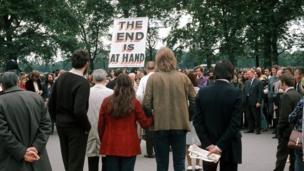

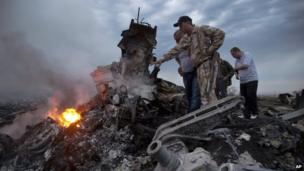
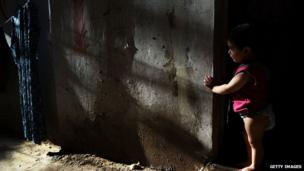
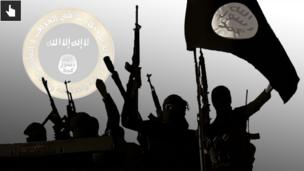
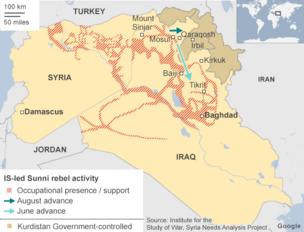
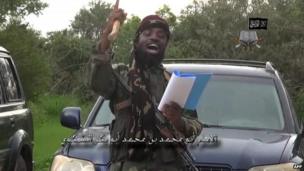
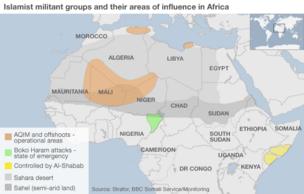
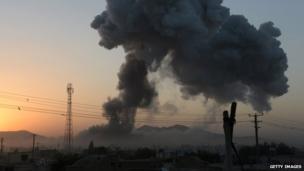
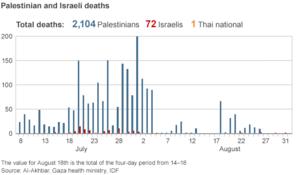
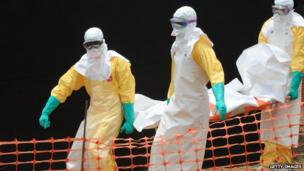
댓글 없음:
댓글 쓰기
참고: 블로그의 회원만 댓글을 작성할 수 있습니다.